Etkileşim (Interaction) Journal
Etkileşim (Interaction) is the Academic Journal of Üsküdar University, Faculty of Communication. The journal is a peer-reviewed, bilingual publication accepting articles in Turkish and English. It is an open access journal published biannually in April-October, available both in printed and online versions. Etkileşim is indexed by DOAJ, EBSCO and TR Dizin.
Etkileşim’s evaluation process operates on the basis of double-blind refereeing. It also has a comment section (Etkileşim/Yorum) where translated articles that do not require peer-review, book reviews and academic essays are included.
Aim & Scope
Etkileşim (Interaction) is the Academic Journal of Üsküdar University, Faculty of Communication. The journal is a peer-reviewed, bilingual publication accepting articles in Turkish and English. It is an open access journal published biannually in April-October, available both in printed and online versions. Etkileşim is indexed by DOAJ, EBSCO and TR Dizin.
Etkileşim’s evaluation process operates on the basis of double-blind refereeing. It also has a comment section (Etkileşim/Yorum) where translated articles that do not require peer-review, book reviews and academic essays are included.
THE AIM OF THE JOURNAL
The aim of Etkileşim is to convey the original works by academics and researchers who are experts in their fields and in other fields of communication sciences and social sciences, expanding to the fields of physical sciences that intersect with communication sciences, to relevant circles. Etkileşim aims to contribute to academic interaction at national and international level.
Üsküdar University Faculty of Communication Academic Journal Etkileşim (Interaction) consists of two parts. First and the main part includes double blind peer-reviewed scientific articles from the field of communication sciences, cultural studies, or social sciences. The articles are to be original studies in Turkish or English. The manuscripts may either be research articles or review articles. The second part includes non-peer reviewed academic studies such as article translations, book reviews, essays, or interviews.
Ethical Principles and Publication Policy
PUBLICATION ETHICS AND MALPRACTICE STATEMENT
Üsküdar University Faculty of Communication’s Academic Journal Etkileşim is an international peer-reviewed scientific journal. Etkileşim shows commitment to implementing publication ethics within the framework of standards recorded by the 'Committee on Publication Ethics (COPE)'.
https://publicationethics.org/guidance/Guidelines
Responsibilities of the Authors
The authors of research articles are responsible for accurately representing the data that the article is based on. Intentional manipulation or misreporting of data by authors is considered a violation of the journal's ethical principles. Articles must contain detailed information in accordance with the principle of reproducibility in scientific research. Review articles also have the obligation to present the existing literature accurately and objectively. In cases such as the use of fake, distorted, or manipulated data, the application of unethical methods in human or animal studies, and the detection of plagiarization, the study will be rejected before the peer review process, and the authors will be informed.
Articles submitted to Etkileşim must not have been previously published digitally or in print, or they must not be in the evaluation process in another journal. The authors cannot publish the articles submitted to Etkileşim in any other medium without notifying the journal management. If the authors withdraw the article or if the Etkileşim review process results in rejection, they have the right to publish it in another medium. To republish an article from Etkileşim in another media outlet, permission must be obtained from the journal management, and it must be stated in the new publication that the article was originally published in Etkileşim. Authors should not use the research findings as the main data in more than one article. Therefore, the data on which the articles submitted to Etkileşim are based should not be the same as the main data of another previously published article. Etkileşim may accept studies derived from theses and dissertations, as well as previous conference presentations and abstract publications, provided that the article clearly states the relevant information. Submission of an article to Etkileşim is considered a declaration that it has not been previously published in another journal or is not under review elsewhere. It is also considered a statement that the publication of the study in Etkileşim is accepted by all authors and the responsible authorities where the research was carried out.
The authors should submit the 'Ethics Committee Approval Report', 'Copyright Transfer Agreement', and the documents showing the similarity rate (received via Turnitin or iThenticate) along with their articles. The articles submitted to Etkileşim must be original works where previous studies are properly cited. References must be made in accordance with academic and ethical understanding, and all cited works must be listed in the references section of the article. Every source that had an impact on the writing of the article should be referenced. Etkileşim does not tolerate any form of academic plagiarism, and its discovery would be against the journal’s ethical standards. In cases where permissions are required, it should be clearly stated that permissions have been obtained. Information acquired through private conversations should not be published without the recorded permission of the source.
Authors should not attempt to learn the identities of peer reviewers or contact them. Manipulation of the double-blind peer review process is a violation of Etkileşim's ethical principles.
If information, raw data, or additional explanations regarding the article are requested during the editorial control, peer review, or publication process or after the article is published, the authors are required to submit the data in question. Therefore, it is mandatory for authors to retain the raw data of their research for a period of five years.
If authors notice an error or a need for correction, they should contact the Editorial Board (Editor in Chief, Editor, Assistant Editors, Language Editors, Secretariat). Authors' requests to withdraw their article are accepted only at the review stage. Article withdrawal requests are not accepted during the printing or publication stages.
Only researchers who have significantly contributed to the study should have their names listed as authors in an article. Additionally, the article must include the name of each researcher who made a significant contribution as an author. Those who contributed to specific aspects of the work, such as language editing, should be included in the acknowledgments section.
The responsibility for correctly stating the names of all the authors belongs to the corresponding author. The corresponding author must also upload the article to the system, ensuring that each author has approved the final version of the work. In some cases, during the editorial control or peer review processes, the Editorial Board may allow author name edits. A request and its reasons should be clearly communicated to the Editorial Board. The Editorial Board will evaluate this request and reach a decision. After the article is accepted, changes in author names may be allowed only in very exceptional cases. The request for change must be submitted to the Editorial Board, along with the reasons and the written consent of all authors. While the Editorial Board evaluates the request, the publication process of the article is put on hold.
All responsibility for the work belongs to the authors collectively.
The authors must disclose all conflicts of interest. These conflicts involve all parties that have the potential to influence and bias the authors' research. In this context, the authors must declare all institutions, organizations, and individuals that provide funding to the research, with whom the authors have financial and personal relationships, where the authors are employed, hold expert or consultancy positions, in which they hold shares, and to whom they have applied for patents. If no financial support was received during the preparation or publishing process of the article or there is no conflict of interest, the authors should state this in a note at the end of the article.
Authors should carefully attend to the revision suggestions of the reviewers, the Editorial Board, or the Editorial Advisory Board and make the necessary changes. In cases where the authors do not approve of the suggestions, they may notify the journal Editorial Board of their reasons. The Editorial Board may evaluate these reasons and accept them if they are justified. The final decision on the publication belongs to the Editorial Board.
All stages of the evaluation, peer review, acceptance, and publication of articles are based on academic and scientific ethics.
Etkileşim adheres to a policy that promotes diversity and equality while respecting all segments of society. Studies containing hate speech, discrimination, marginalization, prejudice, stereotyping, and similar unethical expressions will be rejected before the peer review process. Articles submitted to Etkileşim should be written in an inclusive language. It should not be implied that any individual, community, or group is superior to others for any reason. Furthermore, assumptions or unfounded judgments should not be made about the beliefs, worldviews, or ideologies of the readers. The words "he" and "she" or “he/she” should be avoided as much as possible in English articles or in English abstracts of Turkish articles. It is accepted in English to use the word "they" for the third person singular when necessary. Additionally, providing information about an individual's gender, sexual orientation, ethnicity, age, health, and disability should be avoided unless it is necessary and relevant for the study.
Studies Requiring Ethics Committee Approval
Within the framework of the ethical approach adopted by Etkileşim and in line with nationally and internationally accepted research ethics and policies, the types of research that require the authors to obtain 'ethics committee approval’ are as follows:
* Any research using qualitative or quantitative methods that necessitates participant data collection, including surveys, interviews, focus group studies, observations, experiments, etc.,
* Research that uses humans or animals for experimentation or other scientific purposes,
* Clinical studies conducted on humans,
* Experimental research on animals,
* Retrospective studies in accordance with the Law on Protection of Personal Data (“PPDL”).
Moreover;
* An "informed consent form**" for case reports should be obtained.
* Permissions from the owners of scales, surveys, photographs, and similar visual materials should be obtained, and this information should be included in the relevant sections of the article.
* It must be declared that copyright regulations are complied with for the ideas and artistic works used in the study.
When submitting the article to Etkileşim via DergiPark, it is important to include details about the 'ethics committee approval' in the article and upload the 'Ethics Committee Approval Report' to the system. If necessary, the Editorial Board has the right to request detailed information from the authors regarding this issue. Studies that require 'ethics committee approval' but cannot submit a report will not proceed with the peer review process.
**The informed consent form contains the following information:
I/we hereby declare that an informed consent form was obtained during the data collection process of the study titled …………………………………………………………………. which I/we sent to Etkileşim for publication.
Attached File - Informed Consent Form
Use of Artificial Intelligence Technologies
Authors may use AI technologies during the writing process only to improve the articles’ language and readability. In addition, when they use these technologies, they must ensure human control and make the necessary revisions. AI applications should not be assumed to be reliable technologies, and it should be taken into consideration that they may make mistakes. The authors are responsible for the AI’s uncorrected errors. Additionally, the authors must declare any use of AI technologies. AI cannot be added to articles as an author and cannot be cited as a reference.
Etkileşim does not allow the use of artificial intelligence in the production or modification of the images used in the articles. Basic edits for printing improvements, such as color, brightness, and contrast adjustment, are acceptable when the original image remains undistorted and the information within it remains intact. If the research on which the article is based involves the use of AI technologies, the use of relevant images may be permitted. In such cases, the methodology section should provide a detailed explanation. Additionally, authors must adhere to the usage policy of the relevant AI technology and provide appropriate references.
In cases where AI technologies are used, a statement should be added at the end of the article stating which technology was used for what purpose and that the authors have reviewed the relevant content. AI technologies used for basic grammar edits and reference methods do not require a declaration.
Corrections and Retractions
If authors have any concerns about their work published on Etkileşim, or if readers have concerns about any article, they are advised to contact the journal. If there is a suspicion that ethical principles have been violated in an article that is under review or published in Etkileşim, an investigation based on COPE guidelines may be conducted. The investigation may lead to a request for the authors to address the issue. However, the article may be rejected when necessary. If the article has already been published, corrections may be made, an explanation may be added to the online version by the Editorial Board, or the article may be retracted with a statement regarding the reason for the retraction. Corrections to the article are made in the online version and published with an explanation. Situations that would invalidate the research findings, errors in the research data, or information that would undermine the Editorial Board's confidence in the entire research may result in retraction. The retracted article may continue to be visible online with a statement acknowledging the retraction, or it may be taken down completely. In the event of a takedown, bibliographic data and an explanation will remain visible. In such cases, the authors' institutions may also be informed.
Peer Review and Publication Process
Etkileşim implements an external double-blind peer review process. The identities of the authors are hidden from the peer reviewers, and the identities of the peer reviewers are not disclosed to the authors. All articles submitted to the journal are first subjected to a preliminary review process by the Editorial Board. Articles that pass preliminary review are then sent to at least two independent peer reviewers. The final decision regarding the acceptance or rejection of articles belongs to the Editorial Board, and the board's decision is final. Editors are not involved in decisions about articles they write themselves or those written by their family members or close colleagues.
Details of the evaluation process:
1. The articles should be submitted via the Dergipark system. The authors should submit their articles before the deadline for the call for papers. Manuscripts submitted to the commentary section, Etkileşim/Yorum (such as book reviews, essays, interviews, and translations), are not subject to the peer review process and are evaluated by the Editorial Board.
2. Authors should also upload the 'Ethics Committee Approval Report', 'Copyright Transfer Agreement', and the similarity report (obtained via Turnitin or iThenticate) along with the article.
3. Before the peer review process, the Editorial Board carries out a preliminary review to decide which article will move forward with the peer review. The board takes 'Ethics Committee Approval Report', 'Copyright Transfer Agreement', and the similarity report (obtained via Turnitin or iThenticate) into account while reviewing the article.
4. Etkileşim conducts "external double-blind peer review.". This means that the identities of reviewers and authors are hidden from each other throughout the entire review process. Articles are sent to peer reviewers as anonymized documents. After preliminary editorial review, articles are sent to two peer reviewers who are experts in their fields and are affiliated with separate institutions.
5. If both peer reviewers accept the article, the Editorial Board will discuss and decide whether to accept it for publication at their meeting. The final decision belongs to the Editorial Board, and the board's decision is final. The Editorial Board may request additional revisions from the authors when necessary.
6. If one or both peer reviewers decide on minor or major revisions, the article is forwarded to the authors along with the 'revision' reports. Authors should mark the revisions they have made and send the article to the journal editor within one month.
7. If one of the peer review reports is "accept" and the other is "reject," the article is sent to a third peer reviewer.
8. In the case of a "rejection" report from both peer reviewers, the editor forwards the peer review reports to the authors with the "rejection" decision.
9. Authors should carefully attend to the reviews, criticisms, and suggestions of the peer reviewers, the Editorial Board, and the Editorial Advisory Board and make the necessary revisions. If the authors do not approve the reviews, criticisms, and suggestions, they have the right to submit a report with their justifications to the journal editorship.
10. When necessary, the Editorial Board may re-send the article after the revisions to the same peer reviewers. During this process, a new report may be requested regarding whether the relevant revisions have been made in line with the suggestions.
11. The completion dates of the review process determine the order in which articles move forward to the publication process.
12. Articles are subjected to the proofreading process by the relevant editors according to their language (Turkish/English). Articles are sent to authors for a final check before publication.
13. Authors have the right to withdraw their articles before publication if they provide justification.
14. No fee is paid to the authors for the published articles, and no fee is requested from the authors.
15. Articles are freely available in print and digital formats.
Based on intellectual property and copyright legislation, manuscripts published in Etkileşim can be used for academic purposes with a proper citation. However, they cannot be partially or completely reproduced for commercial purposes.
The Responsibilities of Peer Reviewers
Peer reviewers who are experts in their fields take part in the "external double-blind peer review" process adopted by Etkileşim. This process should be carried out in line with objectivity and scientific standards without compromising academic and ethical principles. Peer reviewers must comply with the following rules during the article evaluation process:
• Notifying the journal management of articles that have been sent to them for peer review and that are outside their field of expertise,
• Not making any effort to learn the identity of the authors or to communicate with the authors,
• Carrying out all kinds of communication with editors through Etkileşim's official electronic channels,
• Operating the article review process in line with the principle of confidentiality,
• Not compromising the principles of impartiality and objectivity in article evaluation,
• In case of any possible conflict of interest, rejection of the review, and reporting the situation to the editors,
• Conducting the peer review by solely focusing on the quality of work, not allowing personal perspective and differences in approach to affect the evaluation process,
• Preparing the article review report by adhering to a scientific approach and understanding without going beyond the limits of academic respect and courtesy,
• Peer reviewers involved in the evaluation process must adopt the journal's publication policy, ethical principles, and editorial conduct.
The Responsibilities of the Editorial Board
The Editorial Board (Editor in Chief, Editor, Assistant Editors, Language Editors, Secretariat) of Etkileşim is responsible for all content published in the journal and undertakes the following roles and responsibilities:
• To undertake all kinds of responsibilities regarding legal processes in accordance with job descriptions,
• To meet authors’ and readers’ information requests,
• To work toward improving Etkileşim,
• Supporting freedom of thought and expression,
• Standing against hate speech, discrimination, and marginalization,
• Respecting ethical principles and intellectual rights,
• To carry out all processes in a transparent manner in accordance with the principle of accountability.
Manuscript Categories of Etkileşim
Articles
Research Articles: Original research papers in the social sciences or communication fields that present findings from scientific research along with a literature review, methodology, results, and discussion.
Review Articles: Papers that offer a thorough analysis and discussion of prior research on a communication or social science topic, as well as the most recent literature and the authors' personal viewpoints.
Commentary Section Etkileşim/Yorum
Essays: Papers in which authors discuss an idea in the field of communication or social sciences and emphasize the significance of a subject from their own views.
Book Reviews: Papers in which a book is reviewed in terms of its field, subject, content, and significance. The authors provide a summary of the book’s content and offer a discussion on the book’s purpose, area of study, strengths, limitations, and contribution to the field. Interviews: Works that represent the perspectives of experts in the field of communication or social sciences on a current subject. The interviewer asks experts questions in order to learn their views and suggestions on current discussions.
Translations: Works in which texts in the field of communication or social sciences are translated into Turkish or English in strict accordance with the original manuscript. Permissions from the authors of the original text and the place of publication should be obtained.
Open Access Policy
All issues and related contents of Etkileşim can be accessed free of charge online in accordance with the policies of the Budapest Open Access Initiative. Users are allowed to read, download, copy, print, search, or link to the full texts of the articles in this journal without asking prior permission from the publisher or the author for non-commercial purposes. This is in accordance with the BOAI definition of open access. The open access articles in the journal are licensed under the terms of the Creative Commons Attribution-NonCommercial-NoDerivatives 4.0 International (CC BY-NC-ND 4.0) license.
Copyrights
Etkileşim adopts an open access policy and publishes studies that have not been published anywhere before, have not been accepted for publication, and/or have not been submitted to another journal. In the process of submitting the papers via DergiPark, authors should upload the “Copyright Transfer Agreement” form to the system. By signing the form, authors grant the copyright to publish the work in Etkileşim, the Academic Journal of Üsküdar University, Faculty of Communication. Etkileşim retains the copyright to the work licensed under the Creative Commons Attribution-NonCommercial-NoDerivatives 4.0 International license (CC BY-NC-ND 4.0). According to the CC BY-NC-ND 4.0 license, unrestricted use, distribution, and reproduction of the original work are permitted for non-commercial purposes only, provided it is properly cited and its authors are credited. No derivative of this work may be distributed.
The form contains the following information:
“I/we hereby declare that the work titled ………………………….… I/we have submitted is not published elsewhere and is not in the publication process of another journal. In the event that the manuscript is accepted for publication, I/we grant the copyright to publish the work to Etkileşim, Academic Journal of Üsküdar University, Faculty of Communication, which will retain the copyright to my/our work licensed under the Creative Commons Attribution-NonCommercial-NoDerivatives 4.0 International license (CC BY-NC-ND 4.0).”
Attached File - Copyright Transfer Agreement
Licence Notice
In accordance with intellectual property and copyright legislation, all text published in Etkileşim can be used for non-commercial purposes with a proper reference. They cannot be reproduced, partially or completely, for commercial purposes. All content is licensed under the Creative Commons Attribution NonCommercial-NoDerivatives 4.0 International License (CC BY-NC-ND 4.0). Etkileşim adopts the framework that Creative Commons has pointed out:
Share: Copy and redistribute the material in any medium or format. The licensor cannot revoke these freedoms as long as you follow the license terms.
Attribution: You must give appropriate credit, provide a link to the license, and indicate if changes were made. You may do so in any reasonable manner, but not in any way that suggests the licensor endorses you or your use.
NonCommercial: You may not use the material for commercial purposes.
NoDerivatives: If you remix, transform, or build upon the material, you may not distribute the modified material.
No additional restrictions: You may not apply legal terms or technological measures that legally restrict others from doing anything the license permits.
OWNER
On behalf of Üsküdar University
A. Furkan Tarhan – Üsküdar Üniversitesi Mütevelli Heyeti Başkanı, İstanbul, Türkiye.
EDITORIAL BOARD
Editor-in-Chief
Professor Dr. Nazife Güngör – Rector, Üsküdar University, İstanbul, Türkiye.
nazife.gungor@uskudar.edu.tr, ORCID: 0000-0002-0743-2445
Editor
Associate Professor Dr. Bahar Muratoğlu Pehlivan – Üsküdar University, İstanbul, Türkiye.
bahar.muratoglu@uskudar.edu.tr, ORCID: 0000-0001-8977-822X
Asistant Editors
Assistant Professor Dr. Denizcan Kabaş – Üsküdar University, İstanbul, Türkiye.
denizcan.kabas@uskudar.edu.tr, ORCID: 0000-0001-7073-8172
Assistant Professor Şükrü Güler – Üsküdar University, İstanbul, Türkiye.
sukru.guler@uskudar.edu.tr, ORCID: 0000-0003-3482-5417
Language Editors
Assistant Professor Dr. Ceren Acun – Üsküdar University, İstanbul, Türkiye.
ceren.acun@uskudar.edu.tr, ORCID: 0000-0002-2438-4788
Assistant Professor Dr. Ceren Saran – Üsküdar University, İstanbul, Türkiye.
ceren.saran@uskudar.edu.tr, ORCID: 0000-0003-2444-2455
Assistant Professor Dr. Maria Pia Ester Cristaldi – Üsküdar University, İstanbul, Türkiye.
mariapia.cristaldi@uskudar.edu.tr, ORCID: 0000-0002-7724-9723
Research Assistant (PhD) Besna Ağın – Üsküdar University, İstanbul, Türkiye.
besna.agin@uskudar.edu.tr, ORCID: 0000-0002-1591-0352
Secretariat
Research Assistant Atila Erdemir – Üsküdar University, İstanbul, Türkiye.
atila.erdemir@uskudar.edu.tr, ORCID: 0000-0001-6618-8008
Research Assistant Onur Coşkun – Üsküdar University, İstanbul, Türkiye.
onur.coskun@uskudar.edu.tr, ORCID: 0000-0003-3611-6649
OWNER
On behalf of Üsküdar University
A. Furkan Tarhan – Chairman of the Board of Trustees, Üsküdar University İstanbul, Türkiye.
EDITORIAL BOARD
Editor-in-Chief
Professor Dr. Nazife Güngör – Rector, Üsküdar University, İstanbul, Türkiye.
nazife.gungor@uskudar.edu.tr, ORCID: 0000-0002-0743-2445
Editor
Associate Professor Dr. Bahar Muratoğlu Pehlivan – Üsküdar University, İstanbul, Türkiye.
bahar.muratoglu@uskudar.edu.tr, ORCID: 0000-0001-8977-822X
Asistant Editors
Assistant Professor Dr. Denizcan Kabaş – Üsküdar University, İstanbul, Türkiye.
denizcan.kabas@uskudar.edu.tr, ORCID: 0000-0001-7073-8172
Assistant Professor Şükrü Güler – Üsküdar University, İstanbul, Türkiye.
sukru.guler@uskudar.edu.tr, ORCID: 0000-0003-3482-5417
Language Editors
Assistant Professor Dr. Ceren Acun – Üsküdar University, İstanbul, Türkiye.
ceren.acun@uskudar.edu.tr, ORCID: 0000-0002-2438-4788
Assistant Professor Dr. Ceren Saran – Üsküdar University, İstanbul, Türkiye.
ceren.saran@uskudar.edu.tr, ORCID: 0000-0003-2444-2455
Assistant Professor Dr. Maria Pia Ester Cristaldi – Üsküdar University, İstanbul, Türkiye.
mariapia.cristaldi@uskudar.edu.tr, ORCID: 0000-0002-7724-9723
Research Assistant (PhD) Besna Ağın – Üsküdar University, İstanbul, Türkiye.
besna.agin@uskudar.edu.tr, ORCID: 0000-0002-1591-0352
Secretariat
Research Assistant Atila Erdemir – Üsküdar University, İstanbul, Türkiye.
atila.erdemir@uskudar.edu.tr, ORCID: 0000-0001-6618-8008
Research Assistant Onur Coşkun – Üsküdar University, İstanbul, Türkiye.
onur.coskun@uskudar.edu.tr, ORCID: 0000-0003-3611-6649
EDITORIAL ADVISORY BOARD
Professor Dr. Dan Schiller – University of Illinois Urbana-Champaign, Champaign, ABD. dschille@illinois.edu, ORCID: 0009-0008-3959-4869
Professor Dr. Erik Knudsen – University of Central Lancashire, Preston, Birleşik Krallık. eknudsen1@uclan.ac.uk, ORCID: 0000-0001-8361-6975
Professor Dr. Gillian Doyle – University of Glasgow, Glasgow, İskoçya. gillian.doyle@glasgow.ac.uk, ORCID: 0000-0003-1817-0684
Professor Dr. Nick Couldry – London School of Economics and Political Science, London, UK. n.couldry@lse.ac.uk, ORCID: 0000-0001-8233-3287
Professor Dr. Natalie Fenton – Goldsmiths, University of London, London, UK. n.fenton@gold.ac.uk, ORCID: 0000-0002-3754-8200
Professor Dr. Nevzat Tarhan – Üsküdar University, İstanbul, Türkiye. nevzat.tarhan@uskudar.edu.tr, ORCID: 0000-0002-6810-7096
Professor Dr. Peyami Çelikcan – İstinye University, İstanbul, Türkiye. peyami.celikcan@istinye.edu.tr, ORCID: 0000-0003-4375-1448
Professor Dr.Dilruba Çatalbaş – Galatasaray University, İstanbul, Türkiye. dcatalbas@gsu.edu.tr, ORCID: 0000-0001-8244-0170
Professor Dr. Halil Nalçaoğlu – İstanbul Bilgi University, İstanbul, Türkiye. hnalcaoğlu@bilgi.edu.tr, ORCID: 0000-0003-1926-1561
Associate Professor Dr. Fábio Fonseca Ribeiro - Universidade de Trás-os-Montes e Alto Douro, Vila Real, Portekiz. fabior@utad.pt, ORCID: 0000-0001-8071-6145
Dr. Paško Bilić- University of Zagrep, Zagreb, Crotia. pasko.bilic@fpzg.hr, ORCID: 0000-0001-5174-7073
SCIENTIFIC ADVISORY COMMITTEE
Professor Dr. Abdülrezak Altun – Ankara University
Professor Dr. And Algül – Üsküdar University
Professor Dr. Aysel Aziz – İstanbul Yeni Yüzyıl University
Professor Dr. Asaf Varol – Maltepe University
Professor Dr. Ayhan Biber – İstanbul Arel University
Professor Dr. Billur Ülger – Yeditepe University
Professor Dr. Deniz Ülke Arıboğan – Üsküdar University
Professor Dr. Ebru Özgen – Marmara University
Professor Dr. Emine Yavaşgel – İstanbul University
Professor Dr. Gülseren Şendur Atabek – Akdeniz University
Professor Dr. Haluk Geray – Ankara University
Professor Dr. Hüseyin Çelik – Aydın Adnan Menderes University
Professor Dr. Nilüfer Timisi Nalçaoğlu – İstanbul University
Professor Dr. Onur Dursun - Çukurova University
Professor Dr. Oya Şakı Aydın – İstanbul Ticaret University
Professor Dr. Ömer Özer – Anadolu University
Professor Dr. Özgül Dağlı – Üsküdar University
Professor Dr. Recep Tayfun – Maltepe University
Professor Dr. Selva Ersöz Karakulakoğlu – Maltepe University
Professor Dr. Senem Duruel Erkılıç – Mersin University
Professor Dr. Senem Gençtürk Hızal – Başkent University
Professor Dr. Sevil Atasoy – Üsküdar University
Professor Dr. Suat Gezgin – Yeditepe University
Professor Dr. Süleyman İrvan – Üsküdar University
Professor Dr. Tuğba Asrak Hasdemir - Ankara Hacı Bayram Veli University
Professor Dr. Ulises A. Mejias – State University of New York
Professor Dr. Vugar Aliyev – Bakü State University
Professor Dr. Zeliha Hepkon – İstanbul Ticaret University
Associate Professor Dr. Emanuele Fadda – University of Calabria
Associate Professor Dr. Giusy Gallo – University of Calabria
Associate Professor Dr. Greg Simons – Turiba University
Dr. Sinan Aşçı – Dublin City University
The deadline for submissions for next issues of Etkileşim will be announced in the coming days.
AUTHOR GUIDELINES
- Below are the paper submission rules of Etkileşim (Interaction) Üsküdar University Faculty of Communication Academic Journal:
- Page set up: 2,5 cm from top, bottom, both left and right. In text line spacing should be 1.5. In references, line spacing should be single.
- Page numbers should be placed at the bottom on the right.
- The main language of the journal is Turkish, contributions in English are also accepted. Revisions regarding to principles may be made by editors/co-editors. Revisions regarding language use, punctuation and abbreviations will be based on the most recent edition of the spelling guide of Turkish Language Institution.
- For Turkish written manuscripts, there should be an English Abstract followed by the Turkish Abstract before the introduction part. For English written manuscripts, there should be a Turkish Abstract followed by English Abstract before the introduction part.
- Maximum length of the manuscripts should be 30 pages including the abstracts and references.
- Abstracts, both in Turkish and English, should be no longer than 300 words including the main title in English and Turkish and five keywords.
- The article title should be 14 point bold, centered and all in upper-case. The subtitles should be left-aligned, 12 point, bold and title case (with first letter of each word in upper-case).
- Name and surname of the author(s) should be placed under the main title, centered, and surname written in capitals. After surname, superscripted asterisk (*) should be placed and information regarding the author/authors’ institutions, contact information and Orcid numbers must be written in Times New Roman 10 point and single line space that should be seen only in the first page of the article, justified in footer.
- Abstract heading should be title case, left-aligned, 12 point and bold. Abstracts and Key Words should be 11 point and 1.5 line spaced.
- Text should be justified, written in Times New Roman 12 points, 1,5 line spacing. New paragraphs should be 1,25” left indented. There should be a single space before the titles within the text.
- Expressions in the text, such as newspapers, books, magazines, artworks, computer games, mobile applications and brand names should be written in italic.
- Footnotes should be justified, written in Times New Roman 10 points, single line spacing. Text should start with a space after the footnote.
- References should be 11 point with single spacing. If the information is longer than a line, the next line(s) should start with 1,25 indent. In cases where more than one work of the same author is used, a straight line is used instead of the author's name in repetitions after the first work.
- In accordance with COPE principles and academic study criteria, ethics committee approval should be obtained depending on the field of study and should be stated in detail in the study.
- In order to evaluate the studies, the level of similarity should be less than 25% in Turnitin / Ithenticate plagiarism report. Studies with similarity rates above 25% will not be considered.
-Referencing Rules
- In Üsküdar University Faculty of Communication Academic Journal Etkileşim, the only referencing method that can be used is referencing within the main text method, that is to say APA 7.0 (American Psychological Association).
- Therefore, references should be mentioned within the main text by indicating author’s surname, publication date and page number cited within parenthesis (Tarhan, 2006, p. 125).
- Extra explanations regarding the main text and other remarks should be given in footnotes.
- These notes should be numbered within the text as 1, 2, 3 and should be given at the end of the page with respective order and corresponding remarks.
- The footnotes for the remarks that are given at the end of the page should also be referred with referencing within the main text method, (APA).
- When quoting in the paper, if a direct quote is less than 40 words, incorporate it into your text and use quotation marks. If a direct quote is more than 40 words, make the quotation a free-standing indented block of text and do not use quotation marks. The quotation should be 10 point and single spaced.
- If the author’s name is given in the main text, only the publication year and page number should be given within parenthesis. (2006, p. 25).
- If there are two co-authors, both authors’ surname should be mentioned: (Couldry & Mejias, 2019, p. 19). If there are more than two co-authors, “et. al” should be included (Alemdar et al., 2004, p. 28).
- If multiple references are made for the same subject, resources should be separated by semicolon (Geray, 2005, p. 31; Moran, 2006, p. 37).
- Consecutive pages should be referenced as (Baudrillard, 2004, p. 20, 38 and 52). Non-consecutive pages should be referenced as (Bauman, 2012, pp. 20-24, 48-56).
- If different studies by the same author are given in the same parenthesis, citations are placed with dates in chronological order. The authors’ surnames are given once; for each subsequent work, only the date should be given (Güngör, 1989, 2008, 2011).
- If multiple publications with same author and same publication year will be referenced, these publications should be differentiated by adding a, b, c, etc to the publication year, (McQuail, 1987a, p. 55) (McQuail, 1987b, p. 40).
- If the author is unknown or not mentioned, first words of the study is used in parenthesis. It should be in italic and the date should be mentioned afterwards.
- It is essential to reach primary sources, however, if cannot be reached due to some hardships, the source cited should be mentioned. E.g. (Güngör, 1997, p. 21 as cited in Storey, 2016, p. 297).
- In electronic sources with no author, source’s domain name and publication date should be specified. The name of the cited source should be in italic. The URL will be given only in the references. E.g. (Radikal, 2016, March 23).
- References to messages in social media accounts must specify the name of the writer and the year in which the message was written. For instance: (Gates, 2013).
- In cases where organizations (groups) are referred to in the text, abbreviations are shown with square brackets [ ] next to the full names of the organizations in the first citation, then abbreviations are used (American Psychological Association [APA], 2017).
- Archive documents such as State Archives of the Prime Ministry, Ottoman State Archives referred within the text should be specified as (BCA. 30.10 / 1.2.12) or (BOA. DH-SYS. 65/7).
- Referencing translated works, name of the author is essential, (Fiske, 1996, p. 25). Translator’s name is specified in the references.
- If cited from an edited book, author’s name of the article should be specified. Full identity of the edited book including the article should be presented in the references.
- Attachments (documents), shall be presented at the end of the text and down below should be a brief information as to the content of the document and proper citation in line with the relevant criteria. Other attachments (Table, Figure, Graphs) will be presented as Additional Table:1, Additional Graph:1 and Additional Figure:3 after the references.
- Figures, graphs and maps within the text should be titled right under and cited source should be given according to APA rules.
-Organizing References
- The list of references should only include the resources, which were referred in the article.
- According to the APA 7.0 rules, references should be sorted alphabetically by the surname of the first authors of the sources.
- If there exists more than one work of an author with the same date in the references, expressions “a, b, c” should be used to distinguish them from each other and this should be adhered to in the references in the text and in the references section.
- The latest version of APA is taken into account for the works that are not included in the citation formats specified below.
PRINTED PUBLICATIONS
Book with One Author
Innis, H. (1950). Empire and communication. Clarendon Press.
Book with Two Authors
Horkheimer, M., & Adorno, T. W. (1972). Dialectic of enlightenment. Continuum.
Book with Multiple Authors
Leiss, W., Kline, S., & Jhally, S. (1986). Social communication advertising. Macmillan.
Translated Book
Barthes, R. (1983). Mythologies (A. Lavers, Trans.). Hill and Wang.
Edited Book
Durham, M., & Kellner, D. (Eds.). (2001). Media and cultural studies: Keyworks. Blackwell.
Chapter/Work in an Edited Book
Graham, A. (1996). Are you now or have you ever been? Conspiracy theory and the X-Files. D. Lavery, A. Hague & M. Cartwright (Eds.), Reading the X-Files (pp. 52-62). Syracuse University Press.
Article from a Peer-Reviewed Journal
Thomas, E. R. (2000). Uses and gratifications theory in the 21st century. Mass Communication and Society, 3(1), 3-37.
Magazine Article
Tseëlon, E. (1998). Fashion, fantasy and horror. Arena, 12, 117.
Newspaper Article with Author
Laughland, O. (2018, May 7). Fate of Iran nuclear deal at stake as UK foreign secretary heads to Washington. The Guardian.
No Author
The Australian. (2009, October 1). Parential attitude key to healthier drinking habits. The Australian.
Unpublished Thesis / Dissertation
Montes, A. L. G. (2014). The use and perception of English in Brazilian magazine advertisements (Unpublished doctoral dissertation). Arizona State University.
Conference Paper/Proceedings
Strömbäck, J. and Luengo, Ó. G. (2006). Framing and election news coverage in Spain and Sweden [Conference Paper]. 4th International Symposium Communication in the Millennium. Eskişehir, Anadolu University.
ONLINE REFERENCES
Articles with DOI Assigned
West, A. (2011). Reality television and the power of dirt: Metaphor and matter. Screen, 52(1), 63-77. https://doi.org/10.1093/screen/hjq050.
Article with no DOI Assigned/Freely Available Online
Haigh, M., & Dardis, F. (2012). The impact of apology on organization – public relationships and perceptions of corporate social responsibility. Public Relations Journal, 6(1), http://www.prsa.org/Intelligence/PRJournal/Documents/2012HaighDardis.pdf
Web Page/Blog Post
Bordwell, D. (2013, June 18). David Koepp: Making the world movie-sized. Retrieved November 12, 2015 from http://www.davidbordwell.net/blog/page/27/
Newspaper Article (with author)
Sullivan, M. (2014, July 28). It’s time to push back when government controls the message. The New York Times. Retrieved March 7, 2016 from https://archive.nytimes.com/publiceditor.blogs.nytimes.com/2014/07/28/its-time-to-push-back-when-government-controls-the-message/
Newspaper Article (no author) Reuters. (2013, October 13). The top films at the North American box office. Reuters. Retrieved July 11, 2014 from http://www.reuters.com/article/2013/10/13/boxoffice-chartidUSL1N0I30A520131013
Citing Social Media
Jenkins, H. [@henryjenkins]. (2021, November 9). I am pleased to announce that I have been able to reclaim my Twitter account from a hostile takeover by hackers. We've lost some folks, but I delighted to be back. Did you miss me? [Tweet]. Twitter. Retrieved December 28, 2021 from https://twitter.com/henryjenkins/status/1457820360766750721?cxt=HHwWgoCs3Z35m7soAAAA
Online Dictionary
Encyclopedia of Social Media and Politics (2014). Working Class. In Encyclopedia of social media and politics. CQ Press. Retrieved December 17, 2015 from http://search.credoreference.com/content/entry/cqpresssomedpol/working_class
Online Encyclopedia
Friend, C. (n.d). Social contract theory. J. Fieser & B. Dowden (Eds.), Internet encyclopedia of philosophy. Retrieved June 28, 2014 from http://www.iep.utm.edu/soc-cont/
Wiki
Post-Structuralism. (n.d). In Wikipedia. http://en.wikipedia.org/wiki/Post-structuralism
Audiovisual Media Motion Picture/Video/DVD
Kazan, E. (Director). (1955). East of Eden [Film]. Warner Bros.
YouTube and Other Video Sharing Sites
DW News. (2022, October 9). What needs to be done to make global industry go green? [Video]. Retrieved October 9, 2022 from https://www.youtube.com/watch?v=fCM_V52Krk4
| Year 4| Issues 7 | April 2021 | Year 3 | Issues 6 | October 2020 | Year 3 | Issues 5 | April 2020 |
|---|---|---|
 | 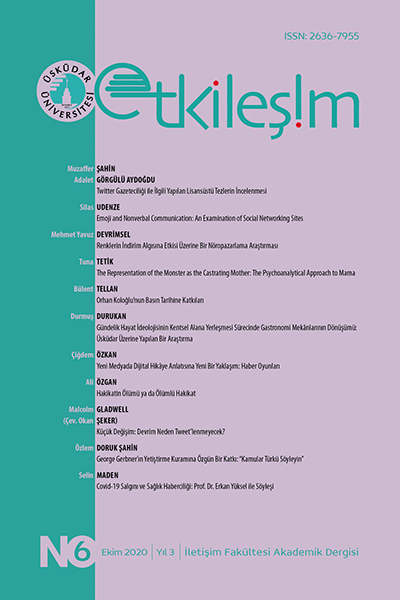 |  |
| Year 2 | Issues 4 | October 2019 | Year 2 | Issues 3 | April 2019 | Year 1 | Issues 2 | October 2018 |
|---|---|---|
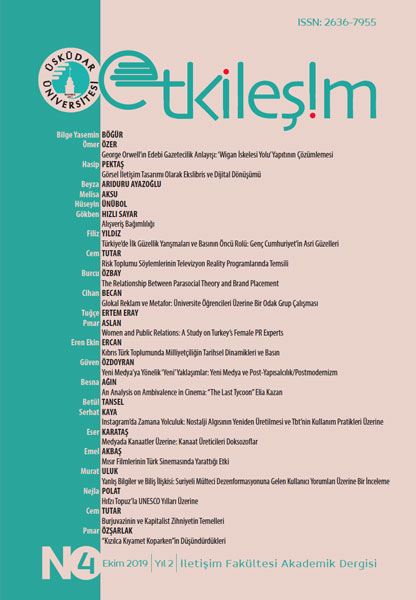 | 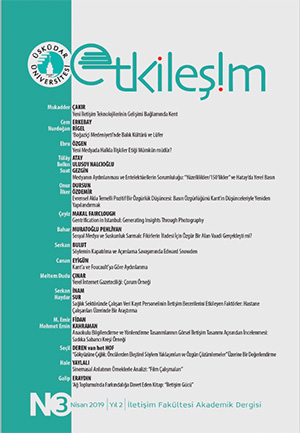 | 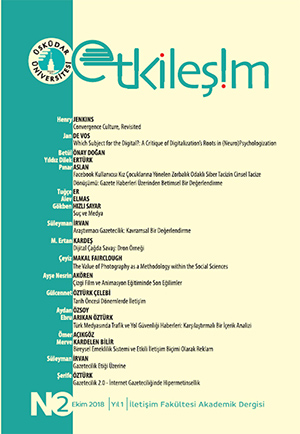 |
| Year 1 | Issues 1 | April 2018 | Year 4 | Issues 8 | October 2021 | Year 5 | Issues 9 | April 2022 |
|---|---|---|
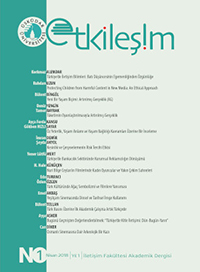 | 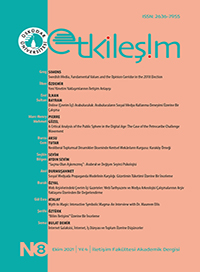 |  |
| Year 5 | Issues 10 | October 2022 | Year 6 | Issues 11 | April 2023 | Year 6 | Issues 12 | October 2023 |
|---|---|---|
 | 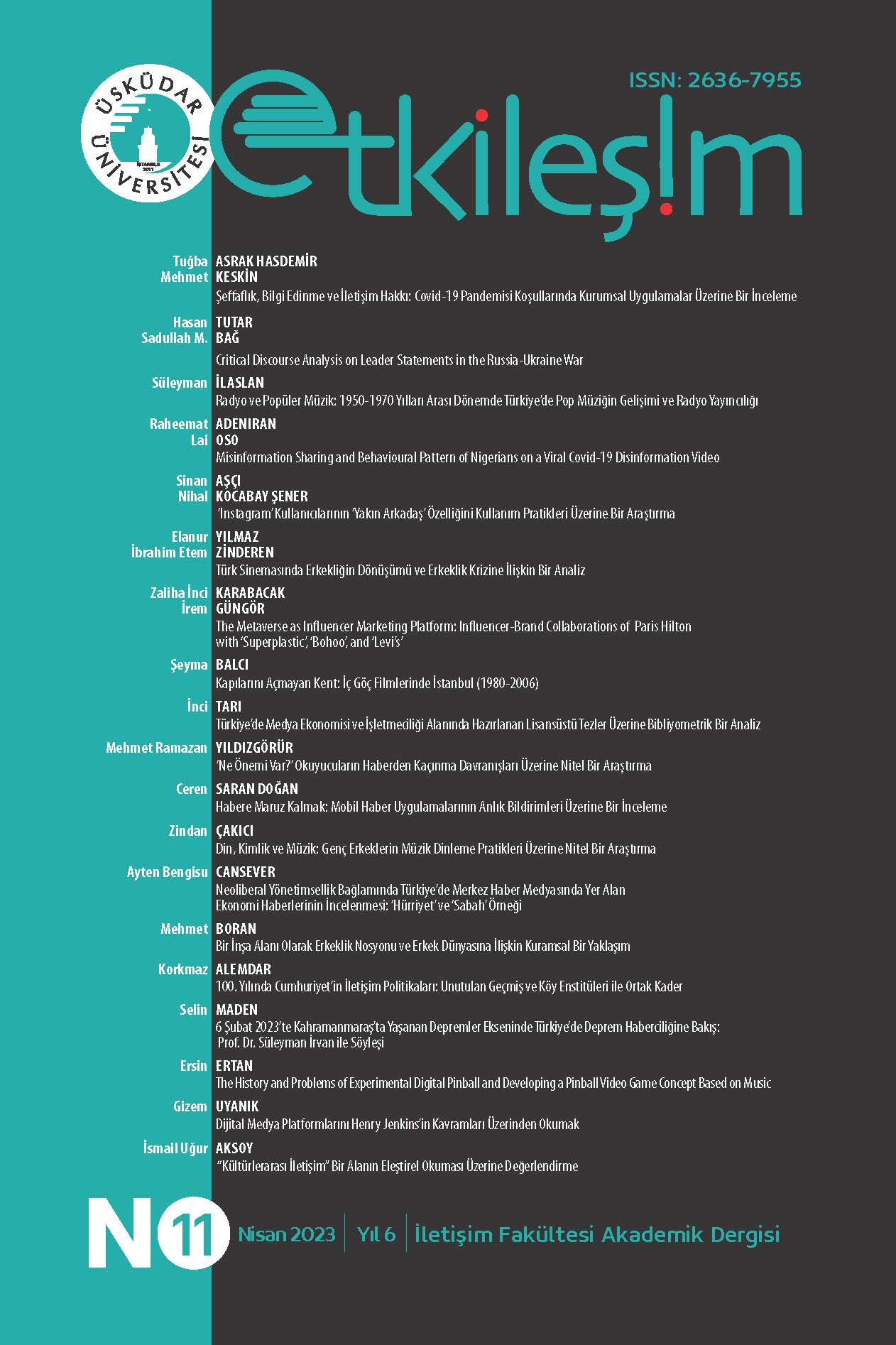 | 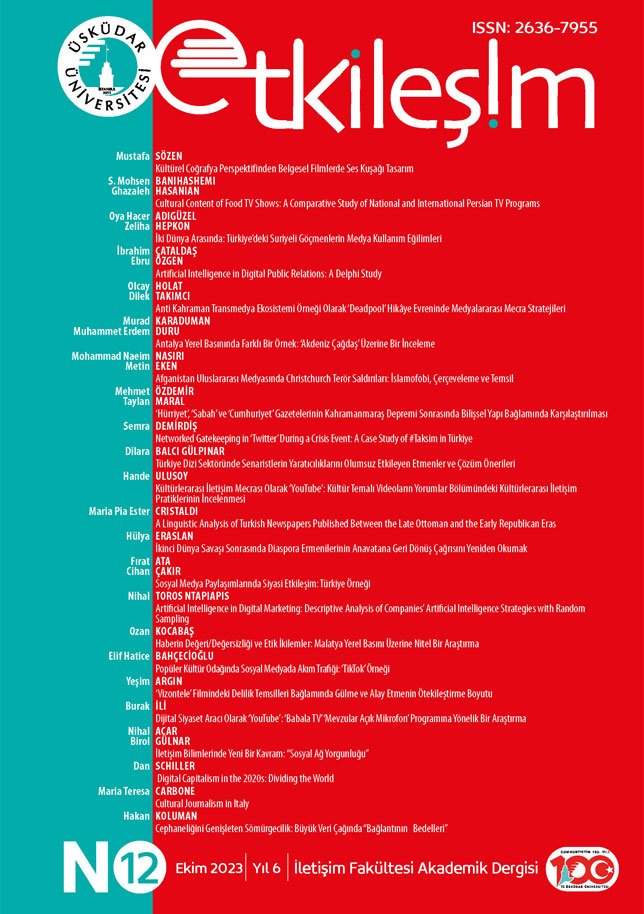 |
| Year 7 | Issues 13 | April 2024 | Year 7 | Issues 14 | October 2024 | |
|---|---|---|
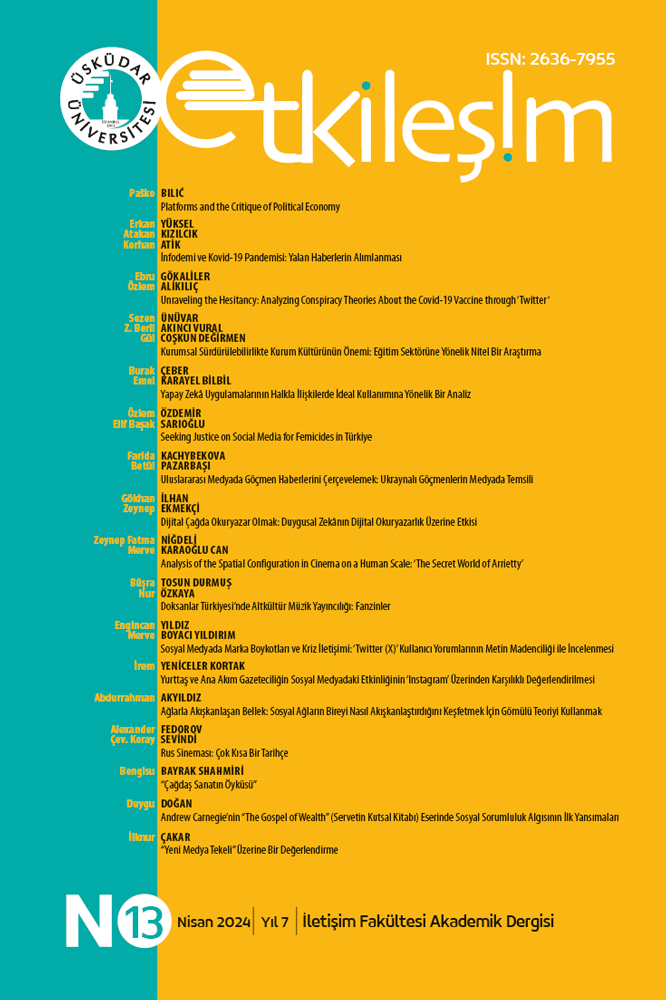 |  |
Editor
Associate Professor Dr. Bahar Muratoğlu Pehlivan – Üsküdar University, İstanbul, Türkiye.
bahar.muratoglu@uskudar.edu.tr, ORCID: 0000-0001-8977-822X
Asistant Editors
Assistant Professor Dr. Denizcan Kabaş – Üsküdar University, İstanbul, Türkiye.
denizcan.kabas@uskudar.edu.tr, ORCID: 0000-0001-7073-8172
Assistant Professor Şükrü Güler – Üsküdar University, İstanbul, Türkiye.
sukru.guler@uskudar.edu.tr, ORCID: 0000-0003-3482-5417
Language Editors
Assistant Professor Dr. Ceren Acun – Üsküdar University, İstanbul, Türkiye.
ceren.acun@uskudar.edu.tr, ORCID: 0000-0002-2438-4788
Assistant Professor Dr. Ceren Saran – Üsküdar University, İstanbul, Türkiye.
ceren.saran@uskudar.edu.tr, ORCID: 0000-0003-2444-2455
Assistant Professor Dr. Maria Pia Ester Cristaldi – Üsküdar University, İstanbul, Türkiye.
mariapia.cristaldi@uskudar.edu.tr, ORCID: 0000-0002-7724-9723
Research Assistant (PhD) Besna Ağın – Üsküdar University, İstanbul, Türkiye.
besna.agin@uskudar.edu.tr, ORCID: 0000-0002-1591-0352
Secretariat
Research Assistant Atila Erdemir – Üsküdar University, İstanbul, Türkiye.
atila.erdemir@uskudar.edu.tr, ORCID: 0000-0001-6618-8008
Research Assistant Onur Coşkun – Üsküdar University, İstanbul, Türkiye.
onur.coskun@uskudar.edu.tr, ORCID: 0000-0003-3611-6649
Journal E-mail:
Görüntüleme : 1476
